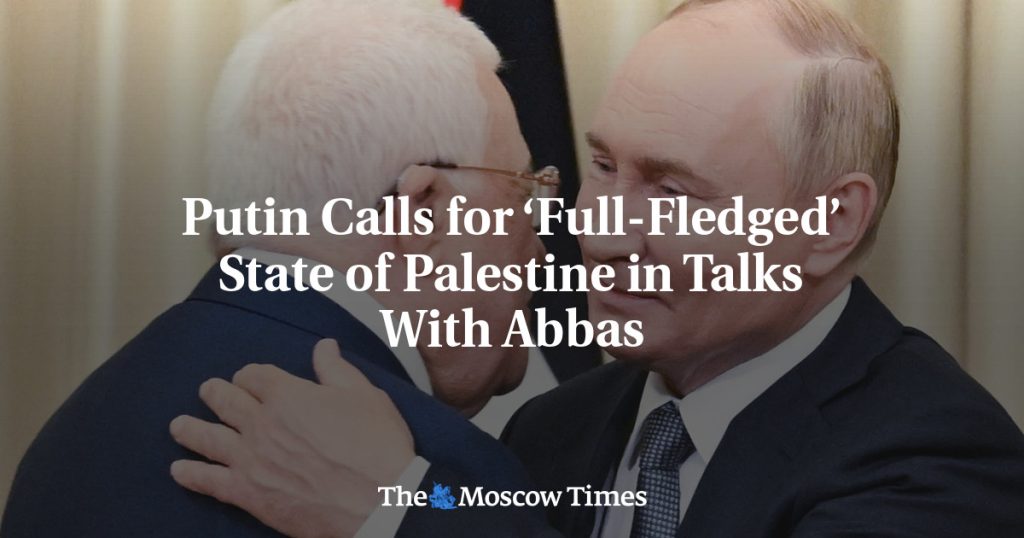Russian President Vladimir Putin reiterated his support for Palestinian statehood during a meeting with Palestinian National Authority President Mahmoud Abbas in Moscow. Putin emphasized the importance of creating a full-fledged Palestinian state as a means to ensure lasting peace in the region. He expressed concern over civilian casualties in Gaza during the Israel-Gaza conflict and stated that Russia is doing everything possible to support Palestine and its people. Abbas had postponed a previous visit to Moscow following a violent attack by Hamas in October, highlighting the complexities of the Israeli-Palestinian conflict and Russia’s relationships with various actors in the region.
Russia has maintained working relations with both Israel and the Palestinian authorities, as well as with Hamas, whom they do not consider a terrorist organization. The Kremlin condemned the killing of Hamas leader Ismail Haniyeh by an Israeli strike in Iran, indicating its commitment to maintaining a balanced approach to the conflict. Putin has consistently advocated for the establishment of a Palestinian state as a long-term solution to the ongoing tensions in the region. The complexities and political sensitivities of the Israeli-Palestinian conflict require careful diplomacy and strategic engagement from all parties involved, including external actors like Russia.
The situation in the Middle East, particularly the Israeli-Palestinian conflict, remains a contentious and challenging issue for the international community. Russia’s engagement with both Israeli and Palestinian leaders reflects its efforts to play a constructive role in promoting peace and stability in the region. By calling for Palestinian statehood and condemning civilian casualties in Gaza, Putin is highlighting the humanitarian aspect of the conflict and emphasizing the need for a political resolution to ensure lasting peace. The complexities of the conflict, including the involvement of various factions and the interests of external powers, make it a delicate and intricate diplomatic challenge.
The ongoing violence in the region, as well as the geopolitical dynamics at play, require careful and strategic engagement from all parties involved. Russia’s willingness to work with both Israel and Palestine, as well as its support for Palestinian statehood, demonstrates a commitment to finding a peaceful resolution to the conflict. By condemning civilian casualties and advocating for a political solution, Putin is signaling Russia’s desire to play a constructive role in addressing the root causes of the conflict and promoting stability in the region. The importance of dialogue, cooperation, and diplomatic engagement cannot be overstated in achieving a lasting and sustainable peace in the Middle East.
Despite the challenges and complexities of the Israeli-Palestinian conflict, there are opportunities for progress and cooperation among the various stakeholders involved. Russia’s engagement with both Israeli and Palestinian leaders, as well as its support for Palestinian statehood, reflects a commitment to promoting peace and stability in the region. By emphasizing the humanitarian aspect of the conflict and condemning civilian casualties, Putin is highlighting the urgency of finding a political solution to address the root causes of the violence and instability in the region. A concerted international effort, guided by the principles of dialogue, cooperation, and diplomacy, is essential to achieving a just and lasting peace in the Middle East.
In conclusion, the Russian President’s calls for Palestinian statehood, along with his condemnation of civilian casualties in Gaza, demonstrate a commitment to finding a peaceful resolution to the Israeli-Palestinian conflict. Russia’s engagement with various actors in the region, including Israel, Palestine, and Hamas, reflects a nuanced and pragmatic approach to addressing the complexities of the conflict. By advocating for political solutions and supporting dialogue among all parties involved, Putin is contributing to efforts to promote peace and stability in the Middle East. The challenges of the conflict require sustained diplomatic efforts and cooperation from all stakeholders to achieve a just and lasting resolution.


